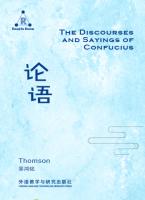Book Review
On Gu Hongming's Translation Thoughts
Confucianism was born in China more than 2,500 years ago. It is one of the precious treasures that the Chinese nation has dedicated to mankind and the essence of traditional Chinese culture. The most important idea of Confucianism is embodied in the Analects of Confucius. In other words, the Analects of Confucius is the representative work of Confucianism. Its influence in the world is unmatched by any other Chinese works. Therefore, from the late Ming and early Qing dynasties, Catholic missionaries began to translate the Analects of Confucius. In the long history of Sino-foreign cultural exchange, especially in the history of Sino-Western cultural exchange from the middle to the late 19th century to the first half of the 20th century, the English translation and dissemination of the Analects of Confucius is an academic phenomenon worthy of attention. As the first Chinese to translate the Analects of Confucius, Gu Hongming, with his unique English attainment and excellent understanding of Confucianism, The Chinese culture is reproduced accurately in the translation, which fully realizes the original purpose of spreading Confucianism.
Chinese, especially ancient Chinese, has its distinctive characteristics: the choice of words and sentences is legal, the combination of meaning is more important than the formal structure, the use of less or no associated words, the relationship between words is often in silence, and the grammatical meaning and logical connection are often hidden between the lines, so that readers and listeners can understand the meaning and relationship. The most important feature of English word selection and sentence construction is the use of form, the emphasis on the coordination of form and structure, the use of multiple or commonly used conjunctions, explicit cohesion, and the use of form and meaning. Take the first chapter of the opening chapter of The Analects of Confucius as an example:
子曰: “学而时习之,不亦说乎? 有朋自远方来,不亦乐乎? 人不知而不愠,不亦君子乎?”
Gu Hongming translated it into: Confucius remarked, “It is indeed a pleasure to acquire knowledge and,as you go on acquiring,to put into practice what you have acquired.A greater pleasure still it is when friends of congenial minds come from afar to seek you because of your attainments.But he is truly a wise and good man who feels no discomposure even when he is not noticed of men.”
This is the most familiar chapter in The Analects of Confucius. The original sentence is concise without any redundant words, which is also in line with the characteristics of Chinese, especially ancient Chinese. In the translation, Gu Hongming added words such as "greater, still, of congenital minds, because of your attachments, but". While "great" and "still" are enhancements on the basis of "pleasure". It can be seen that the degree between the two kinds of happiness indicates the progressive relationship between independent learning and learning from each other.
As mentioned earlier, in the translation of this chapter, Gu Hongming added the additional information of "the Bismarck of the time" to Guan Zhong. This not only enables readers to intuitively understand Guan Zhong, but also can produce a cultural identity. This is another feature of Gu Hongming's translation in order to achieve the purpose of cultural transmission. The Analects of Confucius is mostly a dialogue between Confucius and his disciples, whose names often appear. In order to eliminate the "strangeness and weirdness" of western readers, Gu Hongming deleted most of the names of people and places and replaced them with "a disciple of Confucius". It is undeniable that this practice has reduced the effect of cultural transmission to a certain extent. For example, the omission of Min Ziqian will damage the understanding of western readers about China's "filial piety culture". This may be "helplessness under strong language", but it does not harm the spread of the main idea of Confucian culture. In addition, Gu Hongming has also made a good remedy for this. In his translation, Gu Hongming quotes a lot of names or famous sayings of western philosophers or politicians or the contents of the Bible, and compares them with the characters or plots in the original text. For example, when referring to Yan Hui, Gu Hongming likened it to "the St. John of the Confucian gospel", and a pure, brave and ideal character image came into people's minds. In this way, not only the readers' cultural strangeness is eliminated, but also their cultural identity can be aroused, so as to achieve the original and ultimate purpose of cultural communication.
The purpose of Gu Hongming's translation of Confucianism is to spread Confucianism and Chinese culture. At that time, when Christianity and English were obviously in a dominant position, as a Chinese first independently and actively translated the Confucian classics to the West, his translation undoubtedly played a role that the previous version could not play in understanding the traditional Chinese culture, especially the Confucian culture, and to a large extent achieved its original purpose.



 京公网安备 11010802032529号
京公网安备 11010802032529号